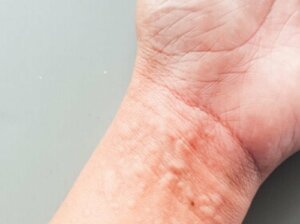How Chronic Urticaria Affects Your Quality of Life


Written and verified by the doctor Leonardo Biolatto
Chronic urticaria affects people’s quality of life and is a more frequent condition than one would think. Specialists estimate that 1% of the world’s population has it, with no significant variations between different regions. The most affected are women between the ages of 30 and 50.
Commonly urticaria is the appearance of reddish hives on the skin, accompanied by intense itching. These hives are of different sizes and can appear and disappear suddenly, as if they were changing place.
Common urticaria becomes chronic urticaria when they’re prolonged over time. Clinically, to diagnose it, the patient must have suffered it for more than six weeks in a year, even when considering the intermediate times without visible lesions.
The causal origin of this pathology is unknown, but specialists have determined that the treatment is about controlling the body’s allergic reaction. For this purpose, antihistamine medications and hygienic-dietary measures are usually prescribed.
Symptoms of chronic urticaria
The characteristic sign of the disease is reddish hives on the skin, with no particular predilection for any specific part of the body. What is constant, on the other hand, is the change in the places of appearance and the different sizes of the hives.
However, since not all the hives that appear on the body are caused by chronic urticaria, this is the list of symptoms that is considered for clinical diagnosis:
- Red hives on any part of the body
- Variable appearance of hives with different shapes, in a pattern of appearance and disappearance
- Swelling in some area of the skin along with these hives appearing
- Appearance of the hives related to triggers, such as stress or exposure to heat
- Intense pruritus: itching

You may be interested in: Tips to Prevent Skin Diseases
Chronic urticaria and quality of life
This study from St Thomas Hospital (United Kingdom) shows that chronic urticaria affects the social life of more than half of the patients suffering from it. In addition, more than half of them feel that the aesthetic issue negatively affects their sex life.
However, records show negative results not only in these aspects, but also in the work environment. 25% of the patients miss work almost once a month. In fact, an association has been found between a greater effect on the quality of life and a lower economic income.
The close social circle of people who have chronic urticaria plays a very important role. They must know the pathology and its manifestations to avoid comments that could undermine self-esteem. When personal contempt increases, there’s less possibility of adherence to treatment.
Stress situations can make chronic hives worse. Even a small effect, such as increased scratching due to anxiety, is a cause of complications, as it could lead to a skin lesion that later becomes infected.
Such is the effect on daily life recorded among patients, that, according to global protocols, part of the medical evaluation is to apply instruments to measure quality of life to get to know the patient’s condition in depth.
Pharmacological treatment
One of the bases of treatment for chronic urticaria is the prescription of anti-allergy drugs. Among them, the most widely used are antihistamines. Here we have two groups and options based on those that produce drowsiness and those that don’t.
Among the antihistamines that produce drowsiness we can mention the following:
- Hydroxyzine
- Doxepin
- Diphenhydramine
Among those with fewer side effects, perhaps the best known is loratadine, located in the same group as fexofenadine and cetirizine.
If skin lesions involve severe inflammation, doctors may prescribe corticosteroids as anti-inflammatory drugs. They’re medicines with a reduced use and for specific purposes, due to their adverse effects. The most recommended is usually prednisone.

For more information read: Corticophobia or Fear of Corticosteroids
Non-pharmacological treatment
In addition to medication, hygienic-dietary measures are fundamental for the improvement of the quality of life of patients with chronic urticaria. These measures will be the ones that contain the long-term symptoms.
Among the non-pharmacological indications, these are some of the most important ones:
- Avoid soaps that aren’t neutral and can further irritate the skin
- Use moisturizing creams to maintain skin hydration
- Use clothes that don’t fit too tightly and that remain loose, avoiding rubbing
- Put on sunscreen to stay outdoors, even on days that don’t seem so sunny
- If you’ve identified the triggers, avoid them
Quality of life is the priority
Although all these measures combined won’t cure the disease, they’ll help improve the quality of life to be able to carry out the daily activities in the best possible way.
You shouldn’t let the disease become disabling or let it be a reason for alienation from personal relationships. Therefore, if this happens, we suggest seeing a psychologist.
All cited sources were thoroughly reviewed by our team to ensure their quality, reliability, currency, and validity. The bibliography of this article was considered reliable and of academic or scientific accuracy.
- E. R. Simons, P. Staubach, G. Sussman, E. Toubi, G. A. Vena, B. Wedi, X. J. Zhu & M. Maurer.The EAACI/GA2LEN/EDF/WAO Guideline for the definition, classification, diagnosis, and management of urticaria: the 2013 revision and update. Allergy 69 (2014) 868–887. 2014
- Poonawalla, T. Kelly, B. Urticaria: A review. American Journal of Clinical Dermatology. 2009; 10 (1): 9-21.
- Maurer M, Weller K, Bindslev-Jensen C, Giménez-Arnau A, Bousquet PJ, Bousquet J, Canonica GW, Church MK, Godse KV, Grattan CEH, Greaves MW, Hide M, Kalogeromitros D, Kaplan AP, Saini SS, Zhu XJ, Zuberbier T. Unmet clinical needs in chronic spontaneous urticaria. A GA2LEN task force report. Allergy 2011; 66: 317–330.
- Arias-Cruz Alfredo, González-Díaz Sandra Nora, Macías-Weinmann Alejandra, Ibarra-Chávez Jesús Arturo, Sánchez-Guerra Daniel, Leal-Villarreal Lucía et al . Calidad de vida en urticaria crónica y su relación con el impacto económico y control de la enfermedad en pacientes atendidos en el Hospital Universitario de Monterrey, México. Rev. alerg. Méx. [revista en la Internet]. 2018 Sep [citado 2019 Jul 19] ; 65( 3 ): 250-258.
- VV.AA.(1997).The Impact of Chronic Urticaria on the Quality of Life. https://pubmed.ncbi.nlm.nih.gov/9068731/
This text is provided for informational purposes only and does not replace consultation with a professional. If in doubt, consult your specialist.








